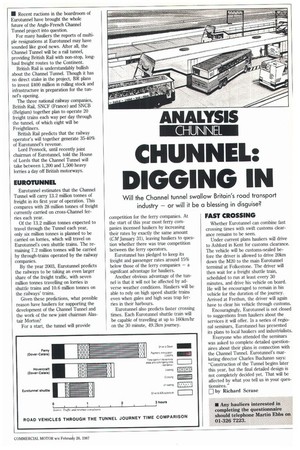CHUNNEL: DIGGING IN
Page 31

If you've noticed an error in this article please click here to report it so we can fix it.
Will the Channel tunnel swallow Britain's road transport industry — or will it be a blessing in disguise?
• Recent ructions in the boardroom of Eurotunnel have brought the whole future of the Anglo-French Channel Tunnel project into question.
For many hauliers the reports of multiple resignations at Eurotunnel may have sounded like good news. After all, the Channel Tunnel will be a rail tunnel, providing British Rail with non-stop, longhaul freight routes to the Continent.
British Rail is understandably bullish about the Channel Tunnel. Though it has no direct stake in the project, BR plans to invest E400 million in rolling stock and infrastructure in preparation for the tunnel's opening.
The three national railway companies, British Rail, SNCF (France) and SNCB (Belgium) together plan to operate 20 freight trains each way per day through the tunnel, of which eight will be Freightliners.
British Rail predicts that the railway operator's will together generate 35-40% of Eurotunnel's revenue.
Lord Pennock, until recently joint chairman of Eurotunnel, told the House of Lords that the Channel Tunnel will take between 1,200 and 1,500 heavy lorries a day off British motorways.
EUROTUNNEL
Eurotunnel estimates that the Channel Tunnel will carry 13.2 million tonnes of freight in its first year of operation. This compares with 28 million tonnes of freight currently carried on cross-Channel ferries each year.
Of the 13.2 million tonnes expected to travel through the Tunnel each year, only six million tonnes is planned to be carried on lorries, which will travel on Eurotunnel's own shuttle trains. The remaining 7.2 million tonnes will be carried by through-trains operated by the railway companies.
By the year 2003, Eurotunnel predicts the railways to be taking an even larger share of the freight traffic, with seven million tonnes travelling on lorries in shuttle trains and 10.6 million tonnes on the railways' trains.
Given these predictions, what possible reason have hauliers for supporting the development of the Channel Tunnel and the work of the new joint chairman Alastair Morton?
For a start, the tunnel will provide
competition for the ferry companies. At the start of this year most ferry companies incensed hauliers by increasing their rates by exactly the same amount (CM January 31), leaving hauliers to question whether there was true competition between the ferry operators.
Eurotunnel has pledged to keep its freight and passenger rates around 15% below those of the ferry companies — a signifcant advantage for hauliers.
Another obvious advantage of the tunnel is that it will not be affected by adverse weather conditions. Hauliers will be able to rely on high speed shuttle trains even when gales and high seas trap ferries in their harbours.
Eurotunnel also predicts faster crossing times. Each Eurotunnel shuttle train will be capable of travelling at up to 160km/hr on the 30 minute, 49.2km journey.
FAST CROSSING
Whether Eurotunnel can combine fast crossing times with swift customs clearance remains to be seen.
Under current plans hauliers will drive to Ashford in Kent for customs clearance. The vehicle will be customs-sealed before the driver is allowed to drive 20km down the M20 to the main Eurotunnel terminal at Folkestone. The driver will then wait for a freight shuttle train, scheduled to run at least every 30 minutes, and drive his vehicle on board. He will be encouraged to remain in his vehicle for the duration of the journey. Arrived at Frethun, the driver will again have to clear his vehicle through customs.
Encouragingly, Eurotunnel is not closed to suggestions from hauliers about the services it will offer. In a series of regional seminars, Eurotunnel has presented its plans to local hauliers and industrialists.
Everyone who attended the seminars was asked to complete detailed questionaires about their plans in connection with the Channel Tunnel. Eurotunnel's marketing director Charles Buchanan says: "Construction of the Tunnel begins later this year, but the final detailed design is not completely decided yet. That will be affected by what you tell us in your questionaires."
El by Richard Scrase
















































































































